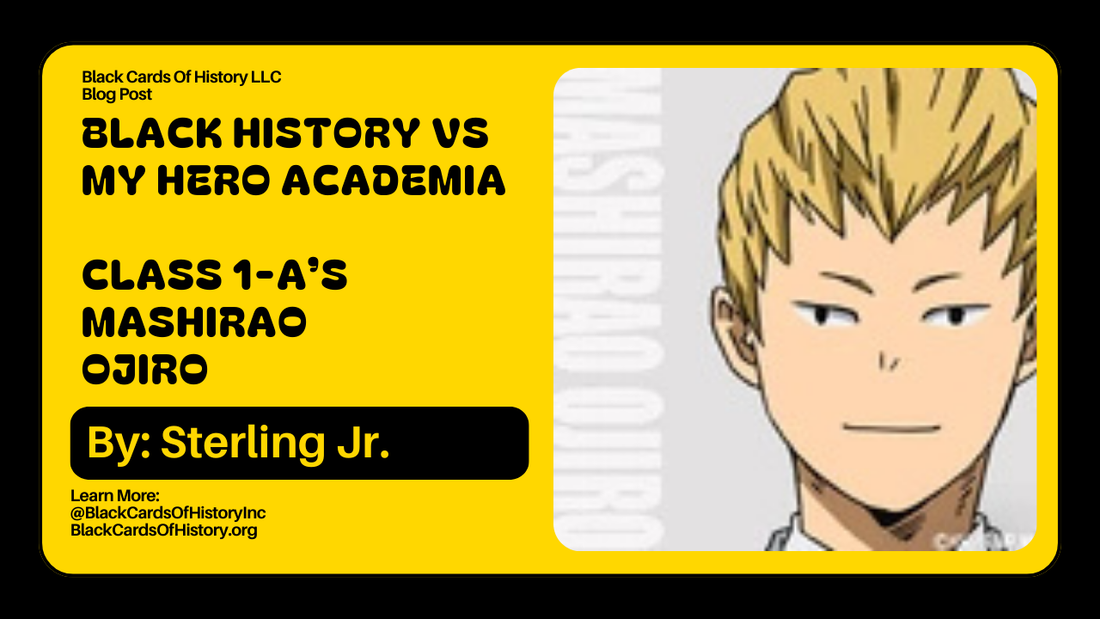Quiet Strength, Bold Respect: Ojiro and the Art of Black Excellence
Rise Beyond Legacy x My Hero Academia Final Season Preblogs
By Sterling, Founder of Black Cards Of History LLC
Introduction
Sometimes, honoring legacy isn’t about speaking the loudest — it’s about moving with purpose, humility, and intention. That’s what I see in Mashirao Ojiro. In the loud, flashy world of heroes, Ojiro might not always stand out in the crowd, but his sincerity and quiet resolve resonate deeply with the way many people support Black History Month — not for the spotlight, but out of genuine respect.
This entry in my Rise Beyond Legacy x My Hero Academia Final Season series focuses on Ojiro and his quiet yet impactful connection to Black excellence, especially through the lens of personal ambition and economic justice.
A Humble Hero with Steady Values
Ojiro gets a 6/10 in my ranking, not because of a lack of heart, but because he’s more of a listener than a leader when it comes to social issues. And honestly? That’s okay. We need people who learn by observing and support without needing the spotlight. His humility and strong sense of discipline give him a unique way of honoring Black history — not with grand gestures, but with consistency and quiet reverence.
He reminds me of the countless unsung supporters of civil rights movements who stood in the background, held signs, protected marchers, and used their bodies as shields without ever being on camera.
Ojiro would never try to center himself in the conversation, but you’d see him in the room, listening, learning, and ready to back others up when needed.
Black History Month: Learning Through Movement
If I were to imagine how Ojiro would participate in Black History Month at U.A. High, it wouldn’t be through speeches or flashy displays. He’d most likely assist in coordinating a martial arts showcase — not for self-glory, but to spotlight Black martial artists throughout history.
Think Jim Kelly, the iconic martial artist and actor who broke barriers in the 70s. Or Shihan Linda Denley, a world champion fighter who inspired countless Black girls to train in karate. Ojiro would gravitate toward people who mastered discipline, honed their bodies and minds, and stayed true to their values.
He wouldn’t make a scene. But you’d see him demonstrating kata routines, handing out programs, or helping younger students understand the connection between martial arts and cultural expression in Black communities. It’d be a lesson in respect — for the art, and for the legacy.
YouTube Assignment: Ojiro’s Subtle Storytelling
If Ojiro had a YouTube channel — and let’s be honest, he probably wouldn’t post often — his Black History Month assignment would be simple but meaningful. Maybe a 5-minute video titled:
"The Art of Discipline: Black Martial Artists Who Changed the Game"
No fancy editing. No dramatic effects. Just soft instrumental music, clean visuals, and Ojiro’s calm voice narrating the stories of fighters like:
- Jim Kelly, who infused martial arts with cool confidence and challenged stereotypes.
- Dennis Brown, a pioneer of karate in the U.S. who created opportunities for thousands.
- Ernest “The Cat” Miller, a three-time karate champion turned wrestling icon.
He might even reference pop culture heroes like Bruce Leroy from The Last Dragon, showing how Black excellence in martial arts extends into the realm of film and creativity. Ojiro’s admiration would be quiet, but real — a reflection of how deep respect doesn’t always need volume.
Reflection: Where Quiet Meets Justice
When we talk about economic justice and personal ambition in the Black community, there’s a lot of noise — and rightfully so. But what Ojiro represents is the necessity of quiet allies. People who listen. People who share platforms. People who don’t try to rewrite the story, but instead hold space for it.
That kind of humility is powerful in its own way. Not everyone needs to lead the march. Some people stand on the sidelines, making sure the march has a path forward. Ojiro is one of them.
And in a world where performative allyship is common, his consistency — however lowkey — reminds us that authenticity speaks volumes.
Final Score: 6/10
Not a leader of the charge, but a reliable presence in the room.
Ojiro shows us that support doesn’t have to be loud to be meaningful.
And honestly? That kind of support deserves recognition, too.
Each hero brings something different to the table — some with fire, some with fists, and others with a quiet sense of duty.
Catch the next installment in my Rise Beyond Legacy x My Hero Academia series as we continue bridging Black history and anime with real-world meaning.

